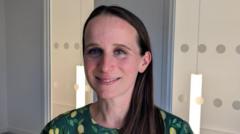Why Did This GP Choose to Work During a Cancer Scare?

The Strain on General Practitioners: Understanding the Pressures of Healthcare Funding in Wales
The state of healthcare in Wales, particularly in general practice, is under significant strain. Doctors like Dr. Emily Jones are finding themselves torn between their own health and the urgent needs of their patients. As staffing issues intensify due to funding shortages, the quality of patient care is at risk. This article delves into the challenges faced by general practitioners (GPs) in Wales, the outdated funding models that exacerbate these challenges, and the implications for patient care. Understanding these issues is crucial for grasping the current state of healthcare in the UK.
The Reality of Working Through Health Crises
Dr. Jones's experience is not unique; many GPs are confronted with similar dilemmas. The pressure to continue working despite health concerns illustrates a systemic issue in healthcare management. Dr. Jones, after discovering a potentially cancerous lump, felt compelled to prioritize patient care over her own health. The narrative echoes a broader sentiment among healthcare professionals who often sacrifice their well-being for the sake of their patients.
Dr. Jones's story highlights a critical question: what happens when the caregivers themselves require care? The implications extend beyond individual doctors; they affect the entire healthcare system. When GPs feel they cannot take time off, it raises concerns about the sustainability of healthcare delivery and patient safety.
Increased Workloads and the Risk of Burnout
As funding for GP surgeries dwindles, the number of patients per doctor is on the rise. Dr. Rebecca Towner, another GP, notes that she often sees upwards of 30 patients in a single morning. This figure exceeds the safe daily limit of 25 patients recommended by the British Medical Association (BMA). The increasing patient load not only endangers the quality of care but also places immense stress on doctors, contributing to a cycle of burnout and dissatisfaction within the profession.
To illustrate the gravity of the situation, consider the following statistics:
- Some GPs report seeing as many as 40 patients in a single day.
- Almost half of Welsh surgeries claim they receive less funding than required.
- The Carr-Hill formula, used for funding allocation, is based on data over 25 years old.
The Outdated Funding Formula
The Carr-Hill formula, introduced in 2004, was designed to allocate funds based on various factors, including the age and health status of a practice's patient population. However, critics argue that this model is outdated and does not accurately reflect the current needs of GP practices, particularly in deprived areas. Campaigners have pointed out that the data used to inform this formula is from 1998 to 2001, making it inadequate for modern healthcare demands.
As a result, surgeries in poorer regions often find themselves receiving significantly less funding than their counterparts in more affluent areas. This disparity highlights a critical flaw in the funding structure, which can lead to systematically worse access to general practice for those who need it most.
The Human Cost of Underfunding
The repercussions of inadequate funding extend beyond the operational challenges faced by GP surgeries. They also have a profound impact on patient care. GPs like Dr. Towner express concern that the relentless pace of seeing patient after patient increases the likelihood of errors. The lack of adequate time for each patient compromises the quality of care and heightens the risk of misdiagnosis or overlooked health issues.
Furthermore, the emotional toll on healthcare providers cannot be underestimated. The stress and anxiety associated with high patient loads and the fear of making mistakes can lead to a demoralizing work environment. Dr. Towner’s admission that many doctors consider quitting underscores the urgent need for reform within the system.
Impact on Patient Care and Access
Access to GP services is becoming increasingly problematic, particularly in areas that are already underserved. Research from BBC Wales indicates that Whitchurch Road Surgery, for example, has approximately 8,000 patients on its list but can only offer 80 appointments a day, leading to a daunting four-week wait for routine appointments.
This backlog is not merely an inconvenience; it poses significant risks to patient health. Delays in accessing care can lead to worsening conditions and increased healthcare costs down the line. The inequity in service provision, particularly affecting those in poorer communities, raises ethical concerns about the fundamental principles of the NHS.
Voices from the Frontline: Doctors Speak Out
Healthcare professionals from various practices have voiced their frustrations regarding the current funding model. Dr. Matthew Jones, working in another surgery in Heath, emphasizes the inadequacy of the Carr-Hill formula, stating that it fails to represent the actual workload faced by GPs. The financial constraints mean many surgeries cannot hire additional staff, further exacerbating the situation.
Dr. Gareth Oelmann, chair of the BMA's Welsh committee, articulates the ongoing crisis in general practice, calling for urgent reviews of the funding structures in place. The Royal College of General Practitioners has echoed these sentiments, emphasizing that access to care should not be dictated by geographical location or socioeconomic status.
The Future of General Practice: What Needs to Change?
The Welsh Parliament's inquiry into the future of GPs, including the funding model, is a step towards addressing these pressing issues. Stakeholders hope that by revisiting the funding allocation strategies, the government can ensure that GP practices are adequately supported to meet patient needs.
Additionally, there is a need for policy changes that reflect the realities of modern healthcare demands. This includes a comprehensive review of the Carr-Hill formula, ensuring it incorporates current data that accurately represents the demographics and health needs of patient populations across Wales.
Conclusion: A Call for Action
The challenges faced by GPs in Wales highlight a critical intersection of healthcare funding, patient care, and the well-being of healthcare providers. As the pressure mounts on practitioners, the need for systemic change becomes increasingly urgent. It is essential for policymakers to recognize the realities of general practice and act to reform the outdated funding models that are hindering effective patient care.
As we reflect on the current state of healthcare, one must consider: what changes can be implemented to ensure that both patients and healthcare providers receive the support they need? With discussions already underway in the Welsh Parliament, the hope is that meaningful reforms will bring about a brighter future for general practice in Wales.
FAQs
What is the Carr-Hill formula?
The Carr-Hill formula is a method used to allocate funding to GP practices in the UK based on demographic factors such as the age and health of their patient populations. However, it has been criticized for being outdated and not accurately reflecting current healthcare needs.
Why are GPs in Wales experiencing increased patient loads?
GPs in Wales are facing increased patient loads due to staffing shortages, financial pressures, and an outdated funding model that limits the ability to hire additional staff or offer competitive salaries.
What are the implications of underfunding for patient care?
Underfunding can lead to longer wait times for appointments, decreased access to care, and increased risk of errors due to overwhelming workloads for doctors. These factors ultimately compromise the quality of patient care.
The future of general practice in Wales is at a crossroads. As discussions on funding reform continue, it is crucial to consider the human element behind the statistics. How can we collectively advocate for a healthcare system that prioritizes both patients and the dedicated professionals who care for them? #WalesHealthcare #GeneralPractice #GPFunding
```Published: 2025-07-21 21:55:04 | Category: wales



